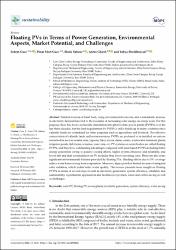Floating PVs in Terms of Power Generation, Environmental Aspects, Market Potential, and Challenges
Citation
Cuce, E., Cuce, P.M., Saboor, S., Ghosh, A. & Sheikhnejad, Y. (2022). Floating PVs in Terms of Power Generation, Environmental Aspects, Market Potential, and Challenges. Sustainability, 14(5), 2626. https://doi.org/10.3390/su14052626Abstract
Limited reserves of fossil fuels, rising environmental concerns, and a remarkable increase in electricity demand have led to the necessity of harnessing solar energy on a large scale. For this purpose, there has been a noticeable stimulation into photovoltaic power plants (PVPPs) over the last three decades, but the land requirement for PVPPs is still a handicap in many countries since valuable lands are considered for other purposes such as agriculture and livestock. For effective conservation of valuable lands and water resources, PVPPs are preferred to be installed on various water bodies such as oceans, seas, lagoons, lakes, rivers, dams, canals, wastewater treatment plants, irrigation ponds, fish farms, wineries, reservoirs, etc. PV systems on water bodies are called floating PVPPs, and they have outstanding advantages compared with land-based PVPPs including better energy generation owing to passive cooling effects, higher system efficiency and reliability, and lower dirt and dust accumulation on PV modules thus lower operating costs. There are also some significant environmental features provided by floating PVs. Shading effects due to PV coverage reduce water losses arising from evaporation. Moreover, algae growth is limited because of mitigated solar radiation, which yields better water quality. This review presents more insight on floating PVPPs in terms of several aspects such as electricity generation, system efficiency, reliability and sustainability, experimental applications and facilities in operation, water and carbon saving as well as challenges.


















